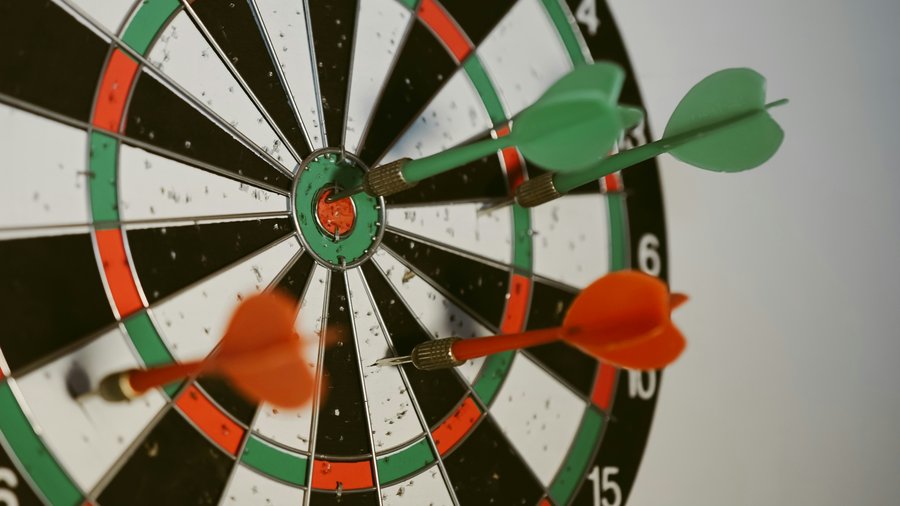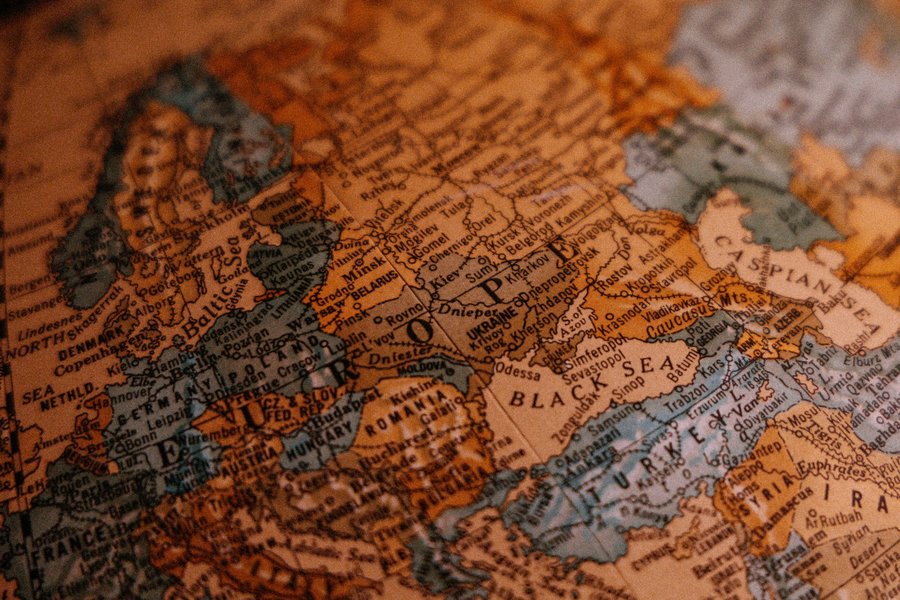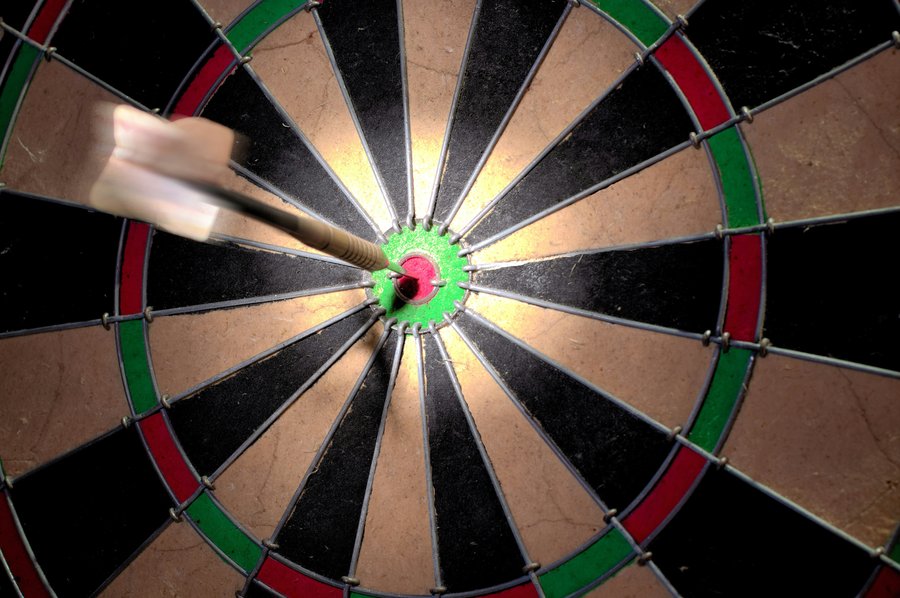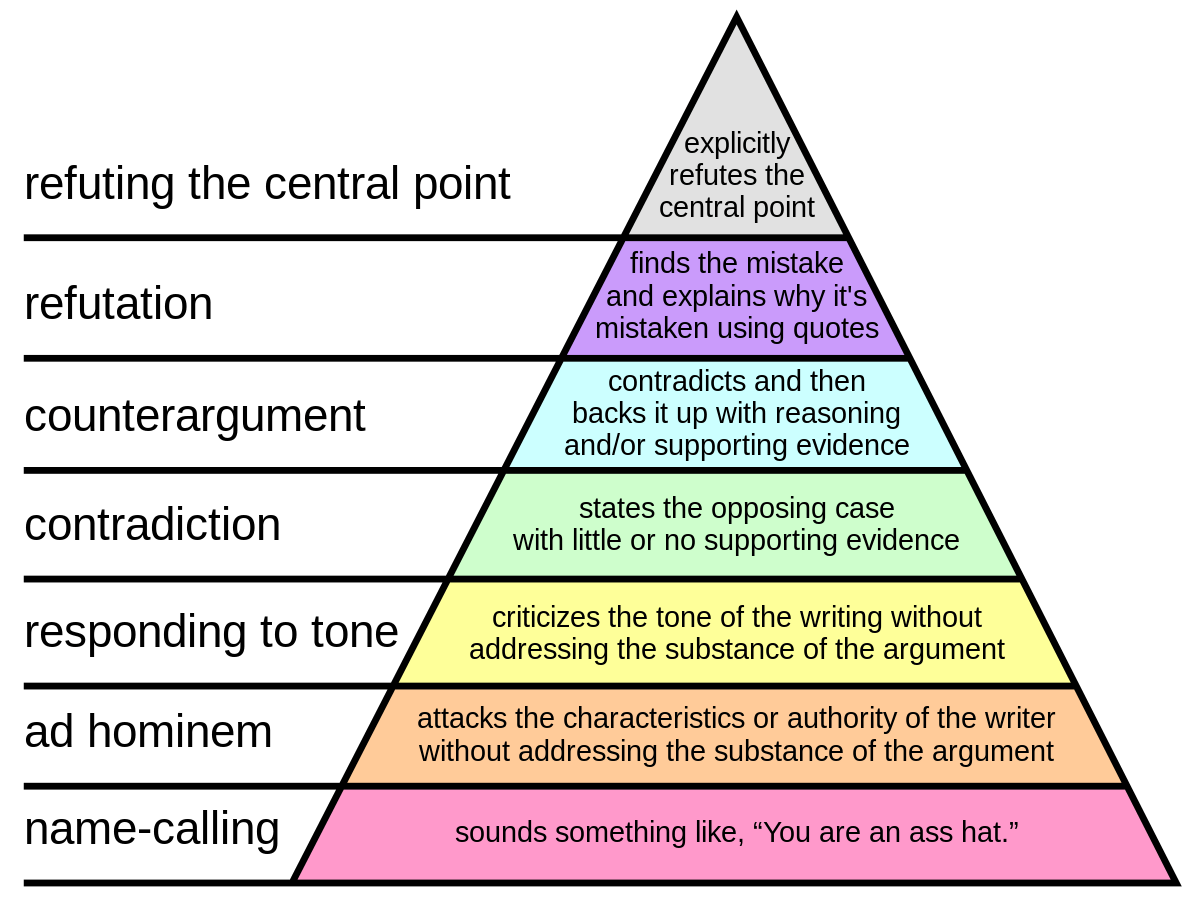
A Powerful Model For Effectively Overcoming the Propaganda Firehose: Proactively Anchoring To The Central Issue
Over the last several years, I've struggled to engage with people who are entrenched in propaganda and have been surprised by how much of an effect it has on people, including myself.
As someone who loves and pursues the truth, I wanted to figure out a way to navigate it so that I didn't make the problem worse but helped others come out of the propaganda spell and equip those facing the same challenge with people they know.
This article is for you if you want to understand propaganda, how to navigate it, and what you can do to reach those you care about. At a minimum, this blog post will help you stand strong when the propaganda black hole tries to suck you in.
As a result of my many interactions with others who have embraced all sorts of harmful ideas, beliefs, and information, I’ve been studying propaganda, how it works, and why it’s used. It’s in that journey I’ve since stumbled upon a model to not only withstand propaganda but to push back against it. My research was originally motivated by Russia’s propaganda efforts in their invasion of Ukraine, but it’s also relevant to the turmoil happening inside America as well.
This essay surveys many of the resources I've discovered and things that have helped me effectively navigate mass deception.
Table of Contents
- Propaganda's Audience & The Core
- Confusion Paralysis: Understanding Propaganda, Its Aims and Its Effects
- Focusing on the Core True Story (Central Issue) & The Target Audience
- Source, Weight, & Impact
- Defending Against Propaganda: Christianity's Core Foundation & New Atheism’s Attacks
- On the Offense: Boldly and Persistently Telling the Salient and Central Truth With Vital Facts
- America: The Central Story and the Power Structure
- Practice Focusing on the Central Issue & Some Insights For Reaching the Most Entrenched
- More Examples Navigating The Central Issue: Russia's Invasion of Ukraine & American Intervention in Syria
- Conclusion
Propaganda's Audience & The Core
Propaganda, messaging that is heavily biased or misleading, is used to move the masses in certain ways to accomplish an agenda that may or may not be explicitly disclosed by the propagandists.

Propaganda was a powerful communication force in totalitarianism including Fascist Nazi Germany and Communist Soviet Union. It’s used by all countries, with many countries utilizing it without the restraint of whether its message is true. In his talk about genocide, historian Timothy Snyder has a salient insight on the matter.
“Since there is no such thing as true, it’s fine to lie. Russia’s post-modern, weaponization of the idea that there is no truth, actually has a non post-modern origin in fascism which says there is not truth to begin with, therefore if you're lying in the service of Russia, you're doing good.” - Timothy Snyder
Deceptive propaganda is often justified in Machiavellian terms (the ends justify any means). By having a greater cause, any means, including morally corrupt ones, can be utilized to accomplish the goal. Deception is no exception. This is the moral poverty logical outcome of tribal morality.
But propaganda works because people want or need to believe the lie. Bonnie Kristian explains.
“You see, even if scale weren’t an issue, this isn’t really a supply-side problem. The problem is demand. Misinformation (and worse) spreads because people like it. Insofar as propaganda from other countries works on Americans, it’s because it tells them things they’re already inclined to think. It asks them to take a half-step farther in the same direction, not reverse course."
Freddie deBoer, who Kristian quotes later in her article, expands on the idea, while also providing a potential antidote.
“The problem isn’t that there are liars; there will always be liars. The problem is that people believe them. You will never stop the flow of haters, but you can produce a populace wise and caring enough to reject them. If as a species we can’t solve that essential problem then we’ll never fix any of it. It has to start with the believers, not with the belief.”
We want to believe the lie, or we want something more than the truth will give us, particularly if the truth is unpleasant. In Jordan Peterson's interview with deception specialist, Robert Trivers, he talks about the idea of seeing evidence of an unpleasant truth but choosing denial instead.
“Imagine that a husband comes home with lipstick on his collar and his wife, who sees it, becomes agitated as a consequence. But then refuses to think through what the implications of that might be. And so the self deception is not one fully thought out proposition against another. It’s a fully thought out (or partially thought out) set of propositions about marriage stability versus an emotional queue of uncertain circumstance that had to be unpacked with difficulty. And avoidance of that is tantamount at least to some form of self deception.
She’s got a fleshed out idea of marriage stability and harmony. All she’s got to contradict that is one piece of visual evidence and an emotion. She can hold onto her pre-existing belief with no work. In order to transform that belief, she’s going to have to do a tremendous amount of exploration and investigation.”
I recently saw Jordan Peterson live here in Atlanta, and one of the key takeaways from this talk was the idea that we have a choice to either embrace tyranny or walk into the wandering wilderness experience. To refuse our wilderness experience is to embrace tyranny. In the example above, this hypothetical spouse has the same choice, to double down on her stability of choosing the wandering experience that comes with pursuing the unpleasant truth.
The key insight here is that we have to be willing to walk away from our benefits and want to pursue truth. Usually, this is hard because we have a lot to lose and we'd rather hang on than let go.
The Core
My aim, with this blog post, is to equip and enable others who love truth and want to navigate around the propaganda, even if the truth is hard to find and difficult to accept. I found a solution; finding and sticking to the core issue.
The other night, I was driving through the city in the dark while it was raining. It had been raining long enough that water had accumulated creating large mirrors on the roads. Street lights, stop lights, and car lights were shining and reflecting across this water alongside the continuing rain. This created a noisy visual horizon and it was hard to see where to focus as a result. The key in these types of moments when driving is to focus on the street lines as a guide. This is a great metaphor for navigating complex issues that are also flooded with noise. Knowing what is most important to focus on is critical for safely moving forward. And then when we know what to focus on, staying disciplined is the next vital effort.
In normal political times, this level of clarity and preparedness is not necessary but America is no longer in the land of normal politics. How we decide 2024 will be a choice that determines if our country has hit rock bottom and wants to move away from that place or whether we’ve got further to fall and the descent will continue.
In recently dealing with the effects of Russia’s firehose of falsehood propaganda, after they invaded Ukraine, and Trump’s chronic deception before and after the 2020 election, I stumbled upon a way to address propaganda that relates to the foundation of my Christian faith. Whether you are a Christian or not, the idea of positioning around the central issue is still an effective one to embrace and leverage for withstanding and combatting deception.
But, before we dive into my propaganda antidote and how we can apply it to the 2024 election, let’s dive deeper into what is propaganda.

Confusion Paralysis: Understanding Propaganda, Its Aims and Its Effects
Time after time, I’ve encountered people swallowing propaganda hook, line, and sinker. That included me on many occasions and during multiple seasons of life. It often feels like the more we try to help people get free from it (or others try to help us out of it), the deeper we descend.
Studying propaganda provided me with powerful answers and insights into why this was occurring now (and in the past). Hannah Arendt, particularly her book, The Origins of Totalitarianism has been a lifeline for me. For this reason among many, it's become one of my favorite books of all time, and critical for deeply understanding propaganda.
Confusion
Confusion is a great word to describe propaganda. The aim of propaganda attacks is to create confusion. It’s to foster doubt. It’s to create enough doubt to buy the propagandist credibility. With confusion anything is possible and we can hide everything.
When someone wants to create doubt and degrade credibility, they don’t need to find falsities. Usually, propaganda simply wants a volume of information because it banks on mistakes, imperfection, or complexity.
“In an ever-changing, incomprehensible world the masses had reached the point where they would, at the same time, believe everything and nothing, think that everything was possible and that nothing was true... Mass propaganda discovered that its audience was ready at all times to believe the worst, no matter how absurd, and did not particularly object to being deceived because it held every statement to be a lie anyhow. The totalitarian mass leaders based their propaganda on the correct psychological assumption that, under such conditions, one could make people believe the most fantastic statements one day, and trust that if the next day they were given irrefutable proof of their falsehood, they would take refuge in cynicism; instead of deserting the leaders who had lied to them, they would protest that they had known all along that the statement was a lie and would admire the leaders for their superior tactical cleverness.” - Hannah Arendt, The Origins of Totalitarianism
The more you say, the more you write, the more information there is to work with, and the more opportunities propagandists can leverage to amplify possibilities that create confusion and doubt. If there’s complexity, propagandists can thrive in facilitating the confusion. Arendt also emphasizes the fact I brought up earlier, about how people are primed and want the lie. It gives them what they want.
Confusion is a great flag for increasing our alertness.
Kenneth Chesebro was involved in Trump’s effort to stay in power after his 2020 presidential election loss and pleaded guilty to “conspiring to file false documents”.
Together Trump and Cheseboro conspired to create a fake set of electors, which would have been an unconstitutional effort to consolidate state power into the presidency. In March 2024, a collection of documents was released about this effort and Cheseboro stated the following. From Politico.
“Communications between Chesebro and a top Trump campaign lawyer in Wisconsin, Jim Troupis, show that Chesebro argued just days after the Nov. 3, 2020 election that creating a “cloud of confusion” by submitting dueling slates of electors would be enough to keep Joe Biden from becoming president.”
Propaganda is now relevant in America’s domestic politics as it was used by Trump to try and unconstitutionally stay in power while providing cover for his crimes. Trump is the master of creating confusion.

Lies, Lies, and More Lies
The more malicious forms of propaganda leverage deception to change minds, or more accurately to further the existing seeds of doubt. This is usually most effective when tapping into existing ideologies and deep-seated attitudes that are ripe for exploitation.
When successfully propagated, deception is the rule of the land.
"In a totalitarian country, everyone lies about everything, all the time." - Jordan B. Peterson
And, if propaganda is unsuccessful in manipulating our underlying attitudes, it at least wants to sideline us so we’re not a force of resistance; confusion has a paralyzing effect. If we don’t participate, the propagandists at least want us to be so confused we don’t know how to act and become passive abdicators.
Lies and blame are flags that propaganda may be afoot.

The Sorting, Indoctrination, Moral Degeneration & Attacks
"You set up a worldview in which the sort of true believers are pitted against the [wishy washy] fans. The way you sort them out is by increasingly extreme lies. And the lies you buy into have some social costs outside of the movement." - Brian Klaas, The Land of Authoritarian Politics
At the point we choose to embrace the lie or to resist it, brings another layer of importance. Another goal of propaganda is a sorting process between those participating in the lie (actively or passively) and those resisting.
"The true goal of totalitarian propaganda is not persuasion, but organization of the polity. ... What convinces masses are not facts, and not even invented facts, but only the consistency of the system of which they are presumably part." - Hannah Arendt, The Origins of Totalitarianism
This is part of why we see more absurd claims and events unfold. They become litmus tests for discovering whose side the person resides. Are they with us or against us?
The goal is to control. And it’s to move people into the larger story being told that reinforces that control in a world of uncertainty.
For those who embrace the lie, Propaganda has an indoctrination role to further entrench adherents. Hannah Arendt says it as follows.
“The essential point is that the necessities for propaganda are always dictated by the outside world and that the movements themselves do not actually propagate but indoctrinate.”
In the totalitarian forms, it aims to tell us what to think and ultimately, to stop us from thinking altogether. By getting us to doubt our most deeply held beliefs, propaganda also creates a deep-seated dependency that degenerates our moral compass.
“Those who deal in it start to believe it. And we all pay… If a man continues to call a good thing bad, he will inevitably lose his sense of moral distinctions.” - Cliff Smith, The Price of Propaganda
And then finally, the role of propaganda is also to attack rivals and enemies, weakening them.
"Insurgent groups such as the Islamic State (ISIS) also used social media for recruiting and directing propaganda blasts at their opponents to unnerve them and weaken their resolve." - Lawrence Freedman & Heather Williams, Changing the Narrative: Information Campaigns, Strategy and Crisis Escalation in the Digital Age (Adelphi series), Page 31
So to recap, propaganda aims to confuse, sort, indoctrinate, and attack. It’s a form of population participation and control. This brings us to one last and final note about propaganda that encompasses all of these facets. The roles we play.

Propaganda Role Play
Propaganda gives people roles to play in this larger narrative and campaign. Propaganda expert Peter Pomerantsev explains in the following quote.
“…all social roles are exactly that: roles that are there to be performed. Propaganda is successful when it gives people a satisfying part to play: someone to be, to love and hate. It also left him with an awareness of how deeply we all need to belong to a group…
It was the performative aspect of propaganda, and the simultaneous need to belong, that struck him when he observed Hitler’s success…“ - Peter Pomerantsev, The man who tricked Nazi Germany: lessons from the past on how to beat disinformation
This quote resonated with me because of how true it felt based on my own experiences. In an era of people lacking rich purpose, people have been invited to play a role in a larger story. That is a compelling offer that is hard to resist if we’re not already living out that deep purpose in our lives. It’s only a matter of time before that desire is exploited.
Now that we have a baseline understanding of propaganda, let’s talk about the core story, central issue, and the audience we’re speaking to as ways to withstand the intellectual assaults and perhaps a way to counter them, for those of us who don’t want to be swallowed up by it.
Without clarity, the confusion sucks us into a never-ending riptide of distractions. So the way to combat confusion is focus and clarity.

Focusing on the Core True Story (Central Issue) & The Target Audience
I’m going to share powerful collected insights I’ve garnered over the last decade, in this section. It wasn’t until I collected and connected these dots, that I realized what a powerful resource we have at hand for navigating deception; communal and societal.
Fundamentally, the antidote comes down to discerning truth, but the type of truth that is most important and compelling. While vital, it’s not easy.
We’re in a unique moment in American History where speaking out can change the outcome of our future. If we don’t pivot towards truth this year, it will become exponentially harder as we go deeper into the abyss.
Embracing truth and resisting truth creates dynamics. When it comes to the core truth, more accurately the most important truth, these tension dynamics become more prevalent. Simply put, when we’re faced with a bedrock important truth we don’t want to accept, we’ll do whatever we can to avoid facing and addressing that truth. We’ll want to respond about secondary and tertiary things, not the primary thing. When that fails, people shift to undermining the credibility of the primary truth sources or eliminating the evidence altogether.
At the end of The Hunger Games: The Ballad of Songbirds and Snakes, Snow wants to find the weapons he used to murder someone so he can destroy them and free himself of the consequences. He’s successful and his rise to power continues.
In his book, Ruling Oneself Out: A Theory of Collective Abdication, Ivan Ermakoff describes the Nazi's legal rise to power in Germany. One of the challenges the opposition faced, and part of why they abdicated to Hitler was their failure to understand their values and the order of importance. They didn’t know how to identify what was most important and thus they defaulted to lesser values they did know. When decisions had to be made, they made poor choices because of their lack of clarity and the consequences were catastrophic.
Part of why I’ve been writing and sharing on societal and political topics is an exercise in discovering these values and their order of importance. It’s to practice finding and anchoring into the central point.
How to Disagree: Paul Graham's Hierarchy of Disagreement
One simple and helpful way to visualize this idea of the central point and the competing distractions is through Paul Graham’s hierarchy of disagreement.
Graham identifies the lowest forms of argument as name-calling and ad hominem (personal) attacks. The highest form of disagreement is explicitly refuting the central point.
The opposite of refuting the central point would be to confuse the truth and avoid the truth, run away from the truth, and in the worst case scenario, destroy the truth. I think of it like a mirror. It reflects back to us what we don’t want to see. Eventually, our only option is to destroy the persistent mirror. These summarize the lower tiers of the pyramid.
One of the reasons I didn’t vote for Trump in 2016 was because of his wake of brokenness and exploitation of others before he ran for president. One of his well-known train wrecks is the Trump University fraud. Tristan Snell was involved in the Trump University lawsuit against Donald Trump, which involved Trump financially exploiting over 6,000 victims.
Snell talks about this idea of focusing on the central idea and how Trump has mastered the art of the lower rungs of the hierarchy. Trump is famous for name-calling and he lives at the bottom of the pyramid. He knows how to create distractions and draw people away from the central point. Snell gives us a glimpse into how to navigate this dynamic.
"You really have to focus on the signal, not the noise. Trump is going to wheel in the the clown car of attorneys and he's going to make all sorts of outlandish arguments. He's also going to do a lot of counter attacking.
There's a different rule that you have to be stoic and stay the course and focus on your case. There is a Temptation in situation like that to go swinging at every ball that they throw at you and a lot of those balls are going to be in the dirt and you can't swing at them. You need to basically focus on what's your case in Chief. What law are you trying to apply? What evidence do you have? Stay focused on that." - Tristan Snell, Trump's New York Civil Fraud Trial on Lawfare
Keep the end game in mind. Stay focused and clear on what matters most. Don’t stray from this vision. Doing so will create tension and often it’s our desire to alleviate the tension that welcomes the distractions. Or it’s a lack of clarity of the vision that makes us vulnerable to distraction.
Part of what helps us withstand propaganda, is a love of truth, even when we don’t like it or it’s at odds with what we want.
When someone can’t refute the central arguments, and they are willing to do morally problematic things, they’re going to undermine the trust and legitimacy of the source. And if that’s not legitimately possible, they’ll do so falsely. And if that’s not possible, they will use force to coerce sources. And if that’s not possible they’ll resort to violence.

It’s also important to keep our primary target audience in mind. In a court case, it’s going to be the jury and judge. If we’re doing a public debate, it’s the watching audience. If we’re attempting to persuade people, it may be the more persuadable and not the entrenched folks. Losing sight of our core audience is another way we get distracted.
By focusing on the core issue and the core audience, we’re actually more likely to impact those inside and outside of the target.

Source, Weight, & Impact
"Source determines weight. Weight determines impact. Impact determines outcome." - Andy Stanley, the Weight of Words part 2
Depending on who (source) says something will change its weight. A parent saying something has more weight than a person at work versus a stranger on an airplane. Role and authority are implied in this dynamic. We usually accept things from sources we trust with little or no scrutiny while being overly critical about sources we don’t trust.
A news or commentary source starts as a stranger to us. How we discover that source gives it weight or can take it away. And then our experience with that source, over time, can increase or decrease its weight.
Because we are limited, weight is a helpful way to filter and contextualize sources. The more precise and de-aggregated we can do it (specificity versus generalization), the better it will help us find the truth and not overly dismiss things we may zealously filter.
So, we have the weight of the source and then we have the weight of the content. The weight of the source gives more weight to the content. Low-weight sources result in higher scrutiny of content.
For dissidents and trolls, we can dismiss them if they don’t focus on the central point. BUT, at the same time, be open to feedback, if it’s focused on the core issue and is demonstrated.
Sometimes the truth can come from the least likely of sources, and at a minimum, they can help us refine and sharpen our clarity and approach. If we’re getting overly distracted by them, it may be a sign that we’re lacking clarity or commitment to the vision.
One way to invite this demonstration is to state the central point and ask the critic or commenter to demonstrate why their information is relevant to it. Tristan Snell, from the earlier quote, adds the following point along this idea.
“If Trump actually raises a legal argument... if he actually throws a real pitch at you, go ahead and swing at it." - Tristan Snell, Trump's New York Civil Fraud Trial on Lawfare
Weight is a practical way to navigate an onslaught of information, particularly from draining sources and critics.
Ultimately we should operate with a Glass Box Approach; effectively test what we find untrustworthy and wisely probe the authorities we trust (Including ourselves) so we minimize our blindspots. Weight is a helpful way to navigate toward this end game.
Now onto my example that inspired this central point model!

Defending Against Propaganda: Christianity's Core Foundation & New Atheism’s Attacks
I’m a Christian who loves the Christian and Jewish scriptures and have lived through the interesting last 25 years of intense American cultural and religious shifts. For me, it’s only enriched and deeper my faith foundations and fruits. I’ve learned from my own liberation how it applies to this topic of propaganda.
After 9/11, there was the rise of the new atheists dismantling shallow forms of Christianity by the four horsemen of new atheism: Christopher Hitchens, Richard Dawkins, Sam Harris, and Daniel Dennett.
A slew of propaganda to dismantle and deconstruct Christianity flowed forth. In retrospect, I’m grateful for this era because I believe it dismantled the weak versions of Christianity and surfaced the stronger more deeply rooted ones. Many of these atheists are now embracing Christianity or at least accepting their cultural Christianity.
What is the weak grounding of Christianity we want to rid ourselves of? It's a misordering of what's central and what's not.
A major reason why the anti-Bible propaganda was so effective is because Christians lost sight of the central point. The church tried to maintain a set of complex cross-generational beliefs that were too far removed from the central point. These dependent beliefs became the central point. And from it, Christianity weakened and was exploited (and continues to be).
What is that belief?
Default biblical authority and inerrancy; the idea that the Bible is flawless and error-free. This became the central point of belief for Christianity.
Biblical inerrancy was a concluding statement based upon other beliefs. It wasn’t the foundation of Christianity (the Bible didn’t exist as we know it in the early church) but rather a resource that came later. Simply put, we made Christianity about a library of books instead of the person of Jesus. And that weakened the church and our faith.
A simple way to think about the ramifications of this idea is that Christianity is true because the Bible is flawless and without error. The problem with holding the bible as flawless, as the foundational premise, is that any antagonist can simply point to an error or contradiction, and then the whole basis of Christianity falls apart and younger and less developed Christians lose their faith, unnecessarily. It's a weak form of Christianity easily attacked by propaganda, including bad-faith attacks.
This tension that Christianity is based on the perfection of the Bible drives Christians to ceaselessly defend the Bible as error-free, which is a tall order for nonscholars, even if it were to be the case. I do believe the Bible was inspired by God and does what it's intended to do; point us to Jesus, his work on the cross, and his reality-changing resurrection.
But, all attacks on the Bible become an existential crisis for Christians when the basis of our faith is a perfect Bible. In a culture where the Bible and Christianity do not have the default authority they once had, this siege can feel more intense and threatening as time goes on and Christianity’s cultural dominance shifts. I believe this approach, misapplying the central foundation, creates a mechanism of dogmatism and control; which is at the core of what new atheism is attacking.
From my own experience, there is an unhealthy siege mentality that is dramatically different from the early Christians who were oppressed in the Roman Empire. Where we modern Christians should be confident and flexible, we’re instead, insecure and dogmatic. But there is a way forward.
"We must anchor the faith of this generation to the event that launched a movement that eventually brought us our Bible." - Andy Stanley
Christianity does not exist because of the Bible, which is not a single book, but a collection of 66 books. The Bible exists because of the early church. And the church exists because of the resurrection of Jesus.
If Jesus didn’t exist, if he died and didn’t rise from the dead, then there is no Christianity and there is no Bible. At the core of Christianity is an event, the resurrection. That event either happened or it did not. The Apostle Paul, an early Christian, says it succinctly.
"If there is no resurrection of the dead, then not even Christ has been raised; and if Christ has not been raised, then our proclamation is in vain, and so is your faith." - Paul, the Apostle, 1 Corinthians 15:13-14, CSB
So if we’re talking about an actual event that was the basis of Christianity moving forward from the movement Jesus began. What matters most is whether that event happened. That is the central issue.
By taking the evidential approach that Christianity is true because the event of the resurrection happened, we flip the dynamic with the anti-Christian propagandists.
Before, Christians had to defend all attacks against the Bible as perfect, to hold onto our faith. Now, the critic has to explain all the evidence brought forth. It’s not enough to explain one line of evidence away. Every piece of evidence has to be explained and explained satisfactorily. And with the historicity of Jesus, there’s a load of evidence. And because of the argument’s strength, it’s persuasive.
Several years ago, I was talking with a former atheist who became a Christian. I asked him how he became a Christian. He said the historicity of Jesus’ resurrection and the preaching of Andy Stanley (who speaks regularly about the historicity). He kept wanting to argue back but kept finding himself agreeing with the arguments and conclusions from the presented evidence.
Core Christianity: The Facts About Jesus' Resurrection
So what is this evidence that even non-Christian scholars agree on?
William Lane Craig, a Christian theologian and philosopher narrows it down to four key facts.
-
FACT #1: After his crucifixion, Jesus was buried in a tomb by Joseph of Arimathea.
-
FACT #2: On the Sunday following the crucifixion, Jesus’ tomb was found empty by a group of his women followers.
-
FACT #3: On multiple occasions and under various circumstances, different individuals and groups of people experienced appearances of Jesus alive from the dead.
-
FACT #4: The original disciples believed that Jesus was risen from the dead despite their having every predisposition to the contrary.
The historical event of the resurrection of Jesus is the core issue because it’s our intersection point that demonstrates Jesus was in fact, God.
Jesus existed, he did miracles, he had a following, he was crucified, his tomb was found empty, he appeared to hundreds of followers, his skeptical brother became a believer, his persecutors (like Saul) became devoted followers, and the church exploded in growth in hostile contexts, eventually become the Roman official religion and shaping the Western world.
These core facts are widely agreed upon, even by skeptic scholars. The facts are not in dispute, but rather how to make sense of them.
For Christians, our belief that the best explanation of this evidence is that Jesus resurrected, is deeply grounded. As a Christian, there still is a leap of faith, but this faith is not ungrounded. It is, in fact, in line with the evidence.
Now if an antagonist comes my way, they have to deal with and provide a better explanation of the individual pieces of evidence as well as the collection as a whole. Historians have attempted and have ideas for these facts (Jesus had a twin brother, people had hallucinations, etc...), but other than the Christian explanation, there has yet to be provided a wholistic evidence-based explanation by historians.
So the two possible conclusions of these facts are to accept the claims of the resurrection event having happened or to choose agnosticism on the topic and not make a claim either way; ‘we don’t or can’t know.’
The liberating benefit of Christian grounding in the event of the resurrection is that I can hold the Old Testament with an open hand without constantly feeling an existential threat. If Job, Jonah, or Noah’s Ark are not literal historical stories, I can explore that idea. Who was Adam? Let’s follow the evidence. I can certainly have inclinations and conclusions, but if I'm right or wrong, it does not unravel my core Christian foundation.
What’s core is whether the resurrection of Jesus happened. It’s central.
With anti-Biblical propaganda, it’s easy to create doubt in the Bible and if our faith is based on the Bible, we can lose our faith or hold dogmatically and irrationally to it. By grounding our faith in the reality of the event, those who want to challenge it have to contend with the facts, and often, those skeptics who seek to disprove the resurrection end up becoming Christians.
Whether you are a Christian or not, the key takeaway for this blog post about propaganda is this model. It's this model of finding and focusing on the true central issue that we can use to withstand propaganda and also push back against it.
Let’s repurpose the idea for some modern situations.

On the Offense: Boldly and Persistently Telling the Salient and Central Truth With Vital Facts
A goal of propaganda is to distract, in any direction, from the central issue. It’s to send everyone off on wild goose chases instead of focusing on the central issue. It’s about changing what is the central issue.
If you’re sticking to the central issue and proactively conveying this true message, and it is salient, you’ve hit the nerve.
In 2020, after the presidential election, because Trump was spreading his firehose of falsehoods about the election being stolen from him, our society focused on whether those claims were true or not, giving Trump cover to illegally and unconstitutionally try and consolidate power and stay in power as president, despite his loss.
The criminal, Trump, swindled us, getting us all focused on the victims of his attempts, and calling them the perpetrators. While the criminal was doing bad things we should have been focused on him. Trump’s propaganda is to get people focused on anything other than his criminal behavior.
This is where Two of Trump's indictments come into play. The federal January 6th indictment and the Georgia RICO indictment.
Trump wants to distract from the core issues of his trials, and the slew of evidence, much of which is already publicly available, of his attempts to illegally stay in power after losing the election. The evidence includes key witnesses from Trump's staff who collaborated with him to consolidate power and overturn the election.
Trump wants enough confusion so his supporters have cover to hide behind in their support of him. His supporters don’t want to accept they’ve embraced a criminal and see him as a vehicle for their ideological aims. It’s a mutually reinforcing relationship.
When it comes to Trump and the 2020 election, what is the central issue? And more importantly, why is this issue important, and why should it be a fundamental filter for someone being unfit to serve as president?
Another simple way to ask this question is, what is the heart of America? What is most important about our country? What is central?
Let’s explore.

America: The Central Story and the Power Structure
It's vital to understand that America's founding was done in response to the tyranny of England. Tyranny — freedom without responsibility — is enabled through the consolidation of power. Thus the heart of America is the separation of real power, through the distribution of power in the presidency, congress, and the Supreme Court. It’s also the distribution of power to the states in our system known as federalism.
Justice Antonin Scalia wrote the following on this topic.
"But it is a mistake to think that the Bill of Rights is the defining, or even the most important, feature of American democracy. Virtually all the countries of the world today have bills of rights. You would not feel your freedom secure in most of them..."
“…what truly protects American freedom: the structural provisions of our Constitution, principally the separation of powers and federalism." ...no bill of rights, standing alone, is sufficient to ensure liberty:"
Scalia expands on this idea in his talk with Congress.
“They are what the Framers of our Constitution called "parchment guarantees," because the real constitutions of those countries—the provisions that establish the institutions of government — do not prevent the centralization of power in one man or one party, thus enabling the guarantees to be ignored. Structure is everything…
Those who seek to protect individual liberty ignore threats to this constitutional structure at their peril.”
So the anti-vision of America is tyranny enabled by the structural consolidation of power. The way America's founders structured the country to prevent this from happening was the separation of power in the federal government and the distribution of power to the states (federalism).
Let’s connect this idea to the central issue of the 2020 presidential election.

Relevant Today: The Central Issue of the 2020 Presidential Election
Biden legitimately won the 2020 election. Trump lied about his loss and tried to stay in power. Trump unsuccessfully attempted to consolidate federal and state power while also leveraging force to stay president, culminating in the Jan 6 capital attack. This is the core story of our last presidential election.
Trump does not revere the Constitution and sees it and the separation of powers as a roadblock to getting what he wants.
“A Massive Fraud of this type and magnitude allows for the termination of all rules, regulations, and articles, even those found in the Constitution…” - Donald Trump, December 3, 2022
But, I'm sensitive to the idea of not just being against Trump. Why am I against him? It's because of what I value, of what America values. So, to get away from justifying our support based on the opposition, I’ve been seeking and working on a positive argument for how to filter presidential candidates. What makes someone unacceptable as a candidate for office?
In seeking the most fundamental vision and value to ground this positive argument, I’ve understood the structural nature of the Constitution inside the story of freedom as that core, most important American idea. In this section, I want to overlay that as we look back at the 2020 election and look forward to the 2024 election.
What’s most important to America continuing?
There is nothing more important to Americans than this value of structural distribution of power. If tyranny is freedom without responsibility, American freedom is freedom based on responsibility.
As Americans, we want responsible presidential candidates who adhere to the structural distribution of power, not presidential candidates who want to consolidate power to dictate selfish outcomes through illegal and unconstitutional means. Trump did the latter.
In 2020 we had an election where Trump threatened to upend the distribution of power. In 2024 we have a candidate, Trump, who tried to consolidate power to stay in power while accusing his opponent of this wrong behavior.
"I'm just not going to leave," Trump told one aide, according to Haberman. "We're never leaving," Trump told another. "How can you leave when you won an election?"... He was even overheard asking the chair of the Republican National Committee, Ronna McDaniel, "Why should I leave if they stole it from me?" - Maggie Haberman, Confidence Man: The Making of Donald Trump and the Breaking of America (Book)
The expansive evidence points to the central story of the 2020 presidential election, as it relates to our 2024 election, being that while Trump was falsely accusing his opponent of stealing the election, he was systematically trying to illegally and unconstitutionally take away state power — through his fake electoral scheme — and congressional power — pressuring the vice president and Congress to change the outcome while not intervening when the capital was attacked. He was trying to consolidate power into the presidency so that he could stay in power despite his legitimate electoral loss.
If Trump had been successful, he would have become the tyrannical king our country was founded to prevent by consolidating the power of the federal and state governments into himself. And then he could do whatever he wanted. Freedom without responsibility. Tyranny.
And what’s even more horrifying is that most Republican leaders willingly went along with Trump's efforts to accomplish his goal of unconstitutional retaining power, all of which was based on a known lie.
It was the strength of the structural separation of powers and people who valued them more than allegiance to Trump that stopped Trump from being successful.
If the president can arbitrarily override the state's electoral votes and get Congress to do what he or she wants, staying in presidential power despite a loss in this case, there is no structural distribution of power. And this distribution of power is what makes America unique and good, and acts as a bulwark to Tyranny. But our country, even with its separations of power, is not invincible and we should not choose people who want to attempt breaking it for selfish ambition.
By this definition, what Trump did was anti-American and tyrannical. The January 6th capital attack was a travesty, but it was also the final exclamation point on an ongoing failed scheme for Trump to stay in power. Jan 6 was the tip of the iceberg of what preceded it. The attack was the last attempt to pressure government leaders to do Trump’s bidding. And if Trump was not going to get what he wanted, he was at least going to break things on his way out.
And our reaction to this event matters. It says something about who we are and the story we want to tell.
"Your attitude towards a specific event in the past reveals your specific intent towards the future… When you deny a specific crime that people with whom you identify carried out in the past, you're affirming that crime." - Timothy Snyder, The War in Ukraine and the Question of Genocide
For 2024, Trump would also gain a weapon on Jan 6 for entrenching his supporters further into the lie. Trump now wants to pardon these criminals and calls them fugitives. By taking this stand, he’s made truth the lie and goodness doing wrong. He's encouraging lawlessness.
"The genius of the “big lie” was not only that it sparked a movement that ended up with January 6 to physically allow him to stay in office. But psychologically the “big lie” was very important because it prevented his propagandized followers from having to reckon with the fact that he lost. And it maintains him as their hero, as their winner, as the invincible Trump, but also as the wronged Trump, the victim. Victimhood is extremely important for all autocrats. They always have to be the biggest victim.” - Ben-Ghiat, The One Way History Shows Trump’s Personality Cult Will End
Unfit For The Office of President
Trump is someone who should never be president again and yet the Republicans (of which I’m a part) have made him their nominee. And a large number of Americans plan to vote for him. That's like a babysitter unsuccessfully trying to murder your child, and giving them another chance to watch your children. I want freedom for them from the tyranny they're now trapped inside.
America had a heart attack in the 2020 election, and that attack was done by Donald Trump and his loyalists. And many Americans are considering another round of his exploitation of us. Gaining power allows Trump to be free from the consequences of his criminal activity.
“The purpose of authoritarianism for these strongmen is to be protected… to protect themselves from jail… They have to get into power and arrange government to protect themselves.” - Ruth Ben-Ghiat, There Is No Alternative on the Bulwark
This central issue is why Trump is calling these indictments and legal court cases a witch hunt. He has to delegitimize them and distract the public from the core issue. He does everything he can to delay because he does not want the testimonies and evidence to become more prominent.
There is a slew of evidence already available and more is coming, including key testimonies from the staff who enabled and participated in Trump's efforts to consolidate power and stay in office. To prevent people from looking at this evidence, Trump is going to create confusion and distractions, particularly to those most loyal to him.
We’re getting a front-row viewing as to whether America gets distracted or whether we stay focused on the central issue at hand; seeing things as they really are.
I’m not sure how long it’ll take or how low we’ll have to go, but I have hope America will see things as they are and move toward truth and goodness, not lies and criminal behavior.

Practice Focusing on the Central Issue & Some Insights For Reaching the Most Entrenched
And its also helpful to note, that propaganda does not care about hypocrisy. Propagandists will accuse their enemies and rivals of things they themselves chronically do. They don't care about living out their values, but they want to exploit people who do. I call this the tyranny of imperfection, where people's goodwill and desire to be good are exploited by nefarious actors to distract and paralyze.
When the truth is not on your side, it requires the use of propaganda. This is an indication of power’s decline, because it has to alter reality to keep power, and that likely means more desperate measures are required to stay in power. Putting on pressure creates tension, but is an early sign of the inevitable end, and the likely escalation of crises.
"An enemy who fights with psyops is... timid, safetyist, risk averse. He's mortally scared and looking for ways out. He'd do or give anything for physical survival" - Kamil Galeev via X
It’s our enslavement to tyranny that makes us vulnerable to propaganda. What I want is for us to have freedom from tyranny. And I want us to have the clarity to know what’s true and the courage to share the truth in tense situations.
Reaching The Hardest To Reach
Often, it’s better to prevent entrenchment because it’s quite difficult if not impossible to reach the most entrenched ideologues, but for those who have family members and friends and want to try, here’s some insight from a cult expert who helps people liberate their loved ones. You can check out the full episode here.
This comes from Steven Hassan, who was in a cult, now helping people get out of them, talking about how his dad could have more effectively reached him.
“What my father should have said, if I could go back in time and coach him, is if he called me up, he said, "Hey Steve, I have a problem." "Yeah, what's up dad?" "Well, the neighbor said something that was very upsetting and I didn't know how to answer him." "Okay, dad, what, what?" "Well, he said that there was an article in the newspaper that said the Moonies had an M16 gun factory. What kind of Messiah has an M16 gun factory? And I didn't know how to answer him. How should I have answered him?And that would have made me think. That would have made me problem solver that would have made an alliance with him to help the neighbor.
And then my father could have, if I was coaching him, could have said, "Oh, that's such a relief, but now that means they can sue… they should sue for writing something that isn't true.
And I would have been, "Yeah, thanks for the tip." And then I would have gone back to the leader and then my father would follow it up. "So what was the lawsuit filed? I'd like to see it." And he could have kept it going. It really would have created dissonance and it really could have made me stop and think. And then that we could have gotten the proof that there was an M16 gun factory. " Steve, you said that your leader said they don't have it now, you know, they do it doesn't sound that trustworthy. Can you really trust that person?"
..that's the technique. That's going to get through. "Help me out. I'm trying to understand. I'm curious, I'm motivated. I really want to believe in you." "Steve, you're an extra honors student. You think this is real? Tell me why."
“It took time, but eventually these conversations planted seeds of doubt in me. My friends... took the time to understand Westboro's doctrines and in doing so, they were able to find inconsistencies I'd missed my entire life."

More Examples Navigating The Central Issue: Russia's Invasion of Ukraine & American Intervention in Syria
One powerful benefit from contending with propaganda and deception is the amazing and trustworthy people, institutions, and resources I’ve discovered along the way to get to the truth. One example is Richard K. Betts at Columbia University.
I had multiple issues with the way realists contextualized and evaluated Russia's invasion of Ukraine. So, I sought to find a steelman version of the realist argument that addressed my concerns (of how to deal with an outright aggressor).
It's dangerous to appease without deep consideration for the possibility that the appeasement is enabling the aggressor to grow in control and power. The appeasement also has a corrupting effect on us.
This dilemma is where I intersected with Betts, discovering his article titled Realism Is an Attitude, Not a Doctrine where he illuminates the central issue of this current European war by looking back in history.
“Underlying such debates are two epochal images from the twentieth century: the contrasting paths to war represented by the crises of 1914 and 1938, which demonstrate the dangers of overreacting and underreacting to threats, respectively. Those images have been overworked in the imaginations of both analysts and decision-makers. We cannot get beyond them, however, because their visions of mistakes to avoid point in opposite directions, and—contrary to the tendency of many to cite one or the other as the crucial lesson—neither of the two can safely be dismissed.” - Richard K. Betts, Realism Is an Attitude, Not a Doctrine

"Chamberlain wanted peace and deescalated. And that's how London looked in a couple of years, after German bombings. Concessions Chamberlain made increased Hitler's standing in Germany. Deescalation gave Hitler time to regroup and build up his war machine. He became much stronger" - Kamil Kazani, How to Defeat Putin via X
"As 1938 exemplifies the image of misreading pure aggression, 1914 exemplifies the image of the “security dilemma.” This concept, formulated by John Herz and further developed by Robert Jervis and others, is the tragic view of international conflict. It assumes that countries are usually opportunistic but averse to paying the high cost of war to make gains, yet cannot trust that their opponents’ aims are similarly limited. So both sides arm to deter or defend, but see each other’s precautionary mobilization as preparation to attack. Acting to maximize one’s own security threatens the opponent’s security. Neither may want war, but they may stumble into it out of misperception, miscalculation and fear of losing if they fail to strike first. In short, if the security dilemma is the real threat, then restraint rather than provocative military action should be the default option." - Richard K. Betts
"Then there is Syria. It presents an even more forbidding set of complications and choices. There is consensus in the West that the Assad regime must be overthrown because it is murderous. And since its radical Islamist opponents are also frightening, the pressure has grown to provide aid to the “moderate” opponents of the government, those associated with the Free Syrian Army. As long as the target is the Assad regime, however, aid to the moderate opposition is less likely to end in replacing the regime with a better one than it is to empower elements worse than Bashar al-Assad.
The moderate opposition may be the right side in Syria, but that is less relevant than who is the main enemy. Is it Assad or is it the radical opposition factions such as the Islamic State, Al Qaeda or the Nusra Front? For too many of the Sunni Arab governments, the answer seems to be Assad. For the West, however, the answer should be all or any of the radical opposition. Paradoxically, supporting the moderate opposition closest to the West does not necessarily work against these main enemies. The radical groups fight among themselves, but if Assad falls, what will replace his regime? It is hardly likely that it will be the moderates, by all accounts the weakest of all the factions. If the West helps the moderates, their strengthened hand may tip the balance of power against Assad and contribute to his overthrow. In the aftermath, however, the moderates are almost certain to be shoved aside by the stronger radicals. If the Nusra Front—or, worse, the Islamic State—ends up in power in Damascus, the assistance to the moderates in the campaign against Assad will in effect have been help to the radicals. The sensible line for the West would be to aid in toppling Assad only after the radical jihadists have been eliminated—something unlikely to be accomplished." - Richard K. Betts
Powerful insights and clarity don’t make for easy decisions, but these examples of finding the central issue are core to making the best decisions.
It took a lot of work and time to discover Richard Betts and this article. The same may be true for you, as you seek the central issue for the issues you’re wrestling with and the questions to which you’re seeking answers.

Conclusion
We’ve explored propaganda, the idea of finding and anchoring into the central issue, the central foundation of Christianity, how that central idea applies to what’s most important to United States government design, and how that overlays with the 2020 and 2024 presidential elections. We also explored two other examples of Russia’s invasion of Ukraine and American intervention in Syria.
Propaganda can be a catfish (awareness heightening to stay active) that strengthens us instead of tears us down. I have a fundamental belief that scrutiny, sometimes even bad faith scrutiny, demonstrates and surfaces the strength of something and acts as a training ground for us. It’s that clarity, strength, and practice that’s required to combat it and prevent further iterations of propaganda.
I've recently come to love and play regularly, the board and dice game, Space Base. The goal of the game is to reach 40 victory points and there are many ways to get there. One of the pathways to victory is buying better ships that provide more rewards on higher probability dice rolls. But there are a large number of cards to pick from, and most cards are not going to help the players gain victory. The key is to know what are the best cards that will most contribute to victory before the other players get to the finish line. It's another great metaphor for recognizing all the shiny object distractions that can seem interesting and helpful but simply distract us from what matters most.
If there’s one thing you want to take away from this post, it’s the idea of prioritizing finding and anchoring into the true central issue. It can’t be what we want the central issue to be. It has to be what actually is the central issue. And as we learn, we should be moving and adapting closer to it.
This clarity will equip you and me to hold fast against the slew of attacks and give us a foundation to speak the truth to the individuals and masses who are persuadable, and hopefully some of those who don’t want to hear it.
For it to work, the central issue has to be true. Then, like Aleksandr Solzhenitsyn says, one man who stops lying can bring down a tyranny.
"It's easy to call things evil, when it's over, when they're dead. The trick is to call things evil while they're doing their evil... That's your obligation and my obligation." - Dennis Prager, PragerU, Ep. 334 — Hamas, Nazis, and Calling Out Evil
The key to this trick is finding, contending with, and embracing the central issue. That foundation will help us avoid blindspots and empower us for what follows.
Additional Resources
- Created on .
- Last updated on .
